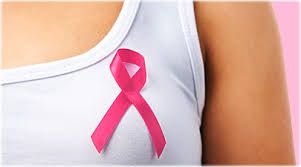
Breast Cancer
Breast cancer is the most common type of cancer in the UK, 55,200 people are diagnosed each year, that is around 150 per day. It is more common in women than men. Most women diagnosed (54,800 each year) with breast cancer are post menopause (over 50), but younger women can also get breast cancer. In rare cases, men can also be diagnosed (around 390 men a year) with breast cancer.
Around 1in 8 women are diagnosed with breast cancer during their lifetime, and 1 in 870 men. There's a good chance of recovery if it's detected in its early stages.
It's vital that you check your breasts regularly for any changes and always get any changes examined by a medical professional.
The Breasts
Breasts are made of fat, connective tissue, and glandular tissue divided into lobes. A network of ducts spreads from the lobes towards the nipple.
One breast is usually smaller than the other. Your breasts may feel different at different times of the month. It is common for breasts to feel lumpy just before your period. Younger women have more glandular tissue than fat in their breasts, making them dense. After the menopause the glandular tissue is gradually replaced by fat, which is less dense.
Breast cancer most commonly starts in the cells that line the ducts of the breast. 9 out of 10 of these cancers have no special features when the cells are looked at under the microscope. They are called invasive breast cancer (NST - No Special Type). Around 1 in 10 breast cancers (10%) are invasive lobular carcinoma. This means that the cancer started in the cells that line the lobules of the breast.
Metastasis
There is a network of lymph glands (a.k.a. lymph nodes) close to the breast. They are part of the lymphatic system that runs throughout the body. Lymph flows through your lymphatic system, it collects waste products and drains into your veins for the waste to be removed. Cancer cells released from the breast tissue can be trapped in the nearby lymph nodes.
If you believe that you may have breast cancer then you should seek medical advice. There are also many ways CANN may be able to aid in prevention (even from re-occurrence) and recovery. From simple dietary and lifestyle changes to supplements.
Book In Now
Around 1in 8 women are diagnosed with breast cancer during their lifetime, and 1 in 870 men. There's a good chance of recovery if it's detected in its early stages.
It's vital that you check your breasts regularly for any changes and always get any changes examined by a medical professional.
The Breasts
Breasts are made of fat, connective tissue, and glandular tissue divided into lobes. A network of ducts spreads from the lobes towards the nipple.
One breast is usually smaller than the other. Your breasts may feel different at different times of the month. It is common for breasts to feel lumpy just before your period. Younger women have more glandular tissue than fat in their breasts, making them dense. After the menopause the glandular tissue is gradually replaced by fat, which is less dense.
Breast cancer most commonly starts in the cells that line the ducts of the breast. 9 out of 10 of these cancers have no special features when the cells are looked at under the microscope. They are called invasive breast cancer (NST - No Special Type). Around 1 in 10 breast cancers (10%) are invasive lobular carcinoma. This means that the cancer started in the cells that line the lobules of the breast.
Metastasis
There is a network of lymph glands (a.k.a. lymph nodes) close to the breast. They are part of the lymphatic system that runs throughout the body. Lymph flows through your lymphatic system, it collects waste products and drains into your veins for the waste to be removed. Cancer cells released from the breast tissue can be trapped in the nearby lymph nodes.
If you believe that you may have breast cancer then you should seek medical advice. There are also many ways CANN may be able to aid in prevention (even from re-occurrence) and recovery. From simple dietary and lifestyle changes to supplements.
